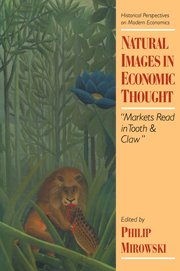Book contents
- Frontmatter
- Contents
- List of contributors
- Acknowledgments
- Part I The Natural and the Social
- 1 Doing what comes naturally: four metanarratives on what metaphors are for
- 2 So what's an economic metaphor?
- Part II Physical metaphors and mathematical formalization
- Part III Uneasy boundaries between man and machine
- Part IV Organic metaphors and their stimuli
- Part V Negotiating over Nature
- Index
1 - Doing what comes naturally: four metanarratives on what metaphors are for
Published online by Cambridge University Press: 19 January 2010
- Frontmatter
- Contents
- List of contributors
- Acknowledgments
- Part I The Natural and the Social
- 1 Doing what comes naturally: four metanarratives on what metaphors are for
- 2 So what's an economic metaphor?
- Part II Physical metaphors and mathematical formalization
- Part III Uneasy boundaries between man and machine
- Part IV Organic metaphors and their stimuli
- Part V Negotiating over Nature
- Index
Summary
Science is like fiction, you see. We make up stories, we sketch out narratives, we try to find some pattern beneath events. We are interested observers. And we like to go on with the story, we like to advance, we like to make progress. Even though they are stories told in the dark.
But you have your equations. Your mathematics –
Oh. Mathematics. Mathematics is like language. No one knows where it came from. No one really knows how it works. More horses and fishes. Horses and fishes trapped in signs. …
Oh my God, he said. I am sorry.
Don't be sorry. There's nothing to be sorry about. I chose this life.
Ackroyd (1989, 159)There are two basic types of people in academic circles: those who think all the major issues in their discipline are settled and those who don't. The former type tends to be correlated with those who dabble in applied mathematical pursuits, though like all good generalizations, it has a countable infinity of exceptions, whereas the latter type tends to congregate in departments of history, anthropology, comparative literature, and sociology. The first type of person probably will not like this introduction or, indeed, many of the chapters in this volume.
Whenever one of the former types encounters one of the latter in some professional capacity, perhaps allowing him- or herself to be drawn out concerning his or her basic presuppositions, the resulting dispute often travels along well-worn grooves.
- Type
- Chapter
- Information
- Natural Images in Economic ThoughtMarkets Read in Tooth and Claw, pp. 3 - 19Publisher: Cambridge University PressPrint publication year: 1994
- 8
- Cited by



